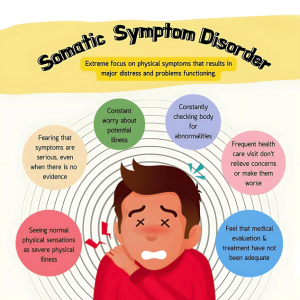
Dr Sathiya Ganesan’s
Healing the Body by Understanding the Mind – Support for Unexplained Symptoms in Children.
Compassionate Care for Unexplained Physical Symptoms in Young Minds
When a child repeatedly experiences physical pain or discomfort, despite normal medical test results, it can be confusing and distressing for both families and doctors. These symptoms are real, not imagined, and often stem from underlying emotional struggles.
Dr. Sathiya Ganesan, Consultant Psychiatrist in Child and Adolescent Mental Health, provides specialised, empathetic treatment for Somatic Symptom and Related Disorders, helping children feel understood, supported, and truly healed.
Understanding Somatic Symptom Disorders in Children
When the Body Speaks the Mind’s Distress – Treating the Emotional Roots of Physical Symptoms

Somatic Symptom and Related Disorders involve physical symptoms (such as pain, fatigue, or stomach issues) that are not fully explained by medical conditions but cause real distress and disrupt daily life. These symptoms are often the body’s way of expressing emotional or psychological stress in children who may not yet have the words to explain what they feel inside.
Common somatic-related conditions in children include:
- Somatic Symptom Disorder – ongoing pain, fatigue, or physical complaints with high anxiety
- Conversion Disorder (Functional Neurological Symptom Disorder) – sudden loss of function (e.g., fainting, seizures, paralysis) without a medical cause
- Illness Anxiety Disorder – extreme fear of having a serious illness
- Factitious Disorder – rare cases where a child may intentionally produce symptoms due to emotional needs
These are not attention-seeking behaviours — they are legitimate mental health conditions that need professional care.
Common Signs of Somatic Symptom Disorders in Children
- Frequent complaints of headache, stomach pain, chest pain, or fatigue
- Multiple doctor visits with normal test results
- Fear or preoccupation with having an illness
- Difficulty attending school due to physical symptoms
- Symptoms worsen with stress or emotional events
- Sudden fainting spells or loss of movement without cause
- Over-concern from the child or parent about health
- Disrupted sleep, appetite, or daily functioning
If these symptoms persist and no medical explanation is found, a psychiatric evaluation can help identify the emotional source.
Sensitive Evaluation and Diagnosis
Dr. Ganesan provides a non-judgmental, child-focused assessment that includes:
- Review of physical symptoms and medical history
- Discussion with both the child and parents about stressors
- Emotional and behavioral screening
- Rule-out of neurological or medical disorders (in collaboration with pediatricians)
- Understanding the context of family, school, and peer dynamics
This collaborative approach ensures that the child feels heard and validated — never dismissed.
Personalized Care Plans and Symptom Management
Treatment focuses on both physical relief and emotional healing. Dr. Ganesan tailors a care plan that includes:
- Psychoeducation about mind-body connection
- Relaxation training and grounding exercises
- Emotional awareness and communication skills
- Restoration of school and social routines
- Symptom tracking without overemphasis or fear
The goal is to reduce distress, improve functioning, and teach healthy emotional coping skills.
Cognitive Behavioral Therapy (CBT) and Mind-Body Techniques
CBT is highly effective in treating somatic disorders. Dr. Ganesan uses:
- CBT for pain and symptom anxiety
- Stress management techniques (breathing, progressive muscle relaxation)
- Biofeedback and guided imagery
- Play therapy or expressive therapy for younger children
- Gradual exposure to avoidant situations (like school, sports)
These techniques empower children to understand their body signals and regain control over their daily lives.
Medication Support (If Needed)
In cases of severe anxiety, sleep disruption, or mood symptoms, Dr. Ganesan may prescribe:
- Low-dose SSRIs or anxiolytics, carefully adjusted
- Short-term use and always as a complement to therapy
Medication is never the only solution — it supports emotional regulation during recovery.
Parental Guidance and Family Education
Parental involvement is crucial. Dr. Ganesan helps parents:
- Respond calmly to symptoms without reinforcing anxiety
- Create structured routines that support confidence
- Avoid unnecessary medical investigations or school absences
- Encourage open emotional conversations at home
When parents understand the emotional basis of somatic symptoms, children recover more quickly and with less fear.
School Support and Academic Reintegration
Somatic symptoms often lead to school refusal or performance issues. Dr. Ganesan supports school reintegration by:
- Liaising with school staff to reduce pressure
- Suggesting gradual return plans and accommodations
- Educating teachers about the mind-body link
- Ensuring the child feels safe and understood at school
A coordinated school approach helps children resume learning with less anxiety.
Online Consultations for Ongoing Recovery
To provide flexibility and reduce stress during recovery, Dr. Sathiya Ganesan offers secure online follow-up consultations for:
- Therapy continuation
- Parental coaching
- Symptom updates
- School reintegration planning
Telepsychiatry helps maintain consistency and comfort in care

Why Choose Dr. Sathiya Ganesan for Somatic Symptom Disorders?
With a deep understanding of how emotions can affect the body, Dr. Sathiya Ganesan offers a compassionate, comprehensive approach to care. His treatment style ensures that:
- The child feels understood and supported
- Parents are empowered with clear guidance
- Symptoms reduce without shame or overmedicalization
- Emotional wellbeing and functioning are restored gently and effectively
Help Your Child Heal from the Inside Out
If your child struggles with unexplained physical symptoms or persistent health fears, emotional care may be the key to recovery. Contact Dr. Sathiya Ganesan today for a gentle, effective, and evidence-based approach to healing both body and mind.
Are the physical symptoms real in somatic disorders?
Yes, the pain or discomfort is very real — even if medical tests are normal. These symptoms often reflect underlying emotional distress and need psychiatric support.
Can children grow out of somatic symptom disorders?
Without treatment, symptoms may persist or shift. Early therapy helps children build emotional coping skills, leading to lasting recovery.
Is it okay to reassure children that “nothing is wrong”?
Simply telling a child “you’re fine” may increase fear. It’s better to validate their experience and provide emotional support while addressing the real cause.
How can parents help at home?
Stay calm, avoid focusing too much on the symptoms, and gently redirect the child to normal activities. Dr. Ganesan provides strategies to reduce anxiety-driven attention to bodily complaints.
Can therapy for somatic disorders be done online?
Yes. Online therapy is effective, especially for follow-ups, symptom tracking, and parent coaching. Dr. Ganesan offers secure telepsychiatry options for convenient, continued care.


